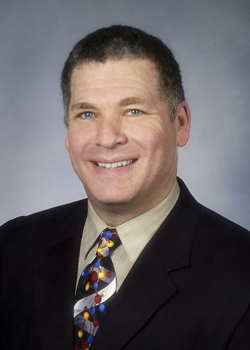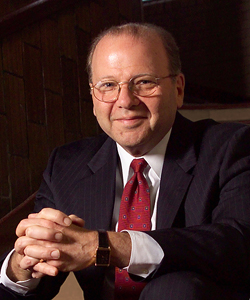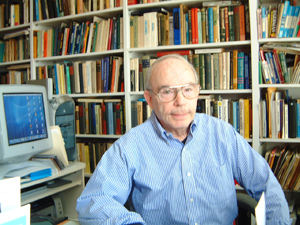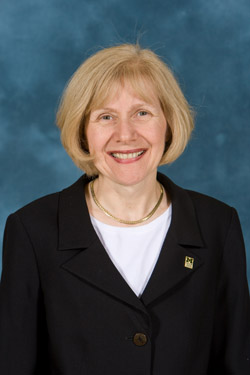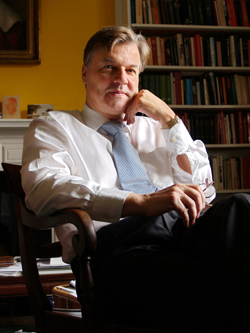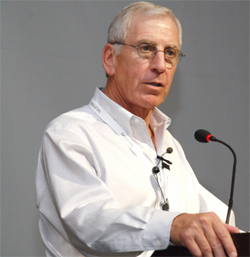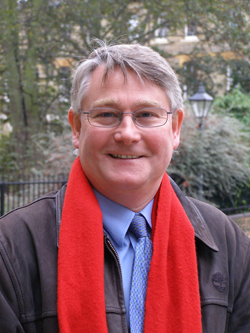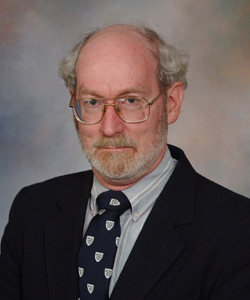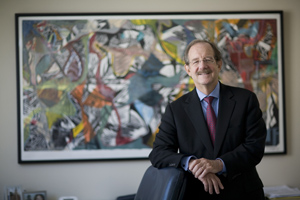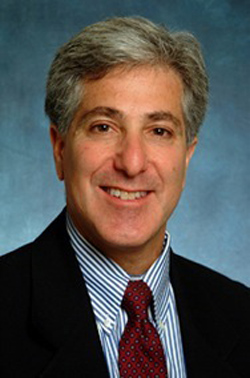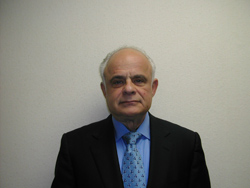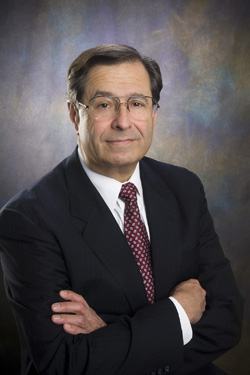May 24, 2010
Society of Scholars inducts new members
Ceremony scheduled for May 26 in Homewood's Mason Hall
The Society of Scholars was created on the recommendation of then president Milton S. Eisenhower and approved by the university board of trustees on May 1, 1967. The society—the first of its kind in the nation—inducts former postdoctoral fellows, postdoctoral degree recipients, house staff and junior or visiting faculty who have served at least a year at Johns Hopkins and thereafter gained marked distinction elsewhere in their fields of physical, biological, medical, social or engineering sciences or in the humanities and for whom at least five years have elapsed since their last Johns Hopkins affiliation. The Committee of the Johns Hopkins Society of Scholars, whose members are equally distributed among the academic divisions, elects a limited number of scholars from the candidates nominated by the academic divisions with postdoctoral programs.
The scholars elected in 2010 will be invested at a ceremony hosted by Provost Lloyd Minor at 4 p.m. on Wednesday, May 26, in Homewood’s Mason Hall, where each will be presented with a certificate and a medallion on a black-and-gold ribbon to be worn with academic regalia. The induction, which brings to 551 the total number of members in the Johns Hopkins Society of Scholars, will be followed by a dinner hosted by President Ronald J. Daniels. The new members will be recognized at Commencement on May 27.
The following listing of the Society of Scholars members elected in 2010 is accompanied by a short description of their accomplishments at the time of their election to the society.
Jeremy M. Berg, Bethesda, Md.
Since 2003, Jeremy M. Berg has directed the National Institute of General Medical Sciences, one of the National Institutes of Health. In this role, he oversees a $1.9 billion budget that funds basic research in cell biology, biophysics, genetics, developmental biology, pharmacology, physiology, biological chemistry, bioinformatics and computational biology.
Before accepting this post, he spent nearly two decades at Johns Hopkins. After serving as a postdoctoral fellow in the School of Medicine and an assistant professor in the Krieger School’s Department of Chemistry, he became the School of Medicine’s director of the Institute for Basic Biomedical Sciences and director of the Department of Biophysics and Biophysical Chemistry.
Berg’s own research has focused on the structural and functional roles that metal ions, especially zinc, play in proteins. This led to major contributions to our understanding of how zinc-containing proteins bind to genetic material. His work has contributed to the design of metal-containing proteins that control the activity of specific genes.
Berg was nominated by Philip A. Cole, professor and director of the Department of Pharmacology and Molecular Sciences in the School of Medicine.
Jared Leigh Cohon, Pittsburgh
Jared Leigh Cohon, president of Carnegie Mellon University since 1997, previously spent 19 years at Johns Hopkins as a Department of Geography and Environmental Engineering faculty member, an assistant and associate dean of the Whiting School of Engineering, and vice provost for research. Here, he developed complex methodologies and tools for water resources analysis and infrastructure planning. He showed that these tools could be useful in diverse applications, including operation of reservoirs and hydroelectric power plants, EMS/fire station location, power plant and hazardous waste landfill siting, transportation network optimization and water treatment plant design.
His 1978 book, Multiobjective Programming and Planning, is a classic in the field. Because of his expertise, he has been called upon by the National Academies to lead investigations on planning for extreme floods and on measuring infrastructure performance, by Pittsburgh regional leaders to spearhead efforts to improve local water quality and by the president of the United States to lead an evaluation of the Department of Energy’s technical work on the Yucca Mountain nuclear waste repository.
Cohon was nominated by Charles R. O’Melia, the Abel Wolman Professor of Environmental Engineering Emeritus in the Whiting School’s Department of Geography and Environmental Engineering.
Herman Z. Cummins, New York
To be inducted posthumously is Herman Z. Cummins, who for more than half a century played a pioneering role in the development of light-scattering techniques and their application to the study of materials. His far-reaching and elegant experiments provided extraordinary insight into problems ranging from the physics of phase transitions and the mobility of biological molecules to patterns created by growing crystals and the mechanisms that cause liquids to change into glass. Cummins, who died in April, also co-invented laser Doppler velocimetry, a technique for measuring the direction and speed of fluids that now has wide use in medicine, chemical engineering and the geosciences.
Author of more than 170 scientific papers and recipient of numerous awards and honors, Cummins was a Distinguished Professor Emeritus of Physics at the City College of the City University of New York. He was also a fellow of the American Physical Society, the American Academy of Arts and Sciences, the American Association for the Advancement of Science and the National Academy of Sciences. Cummins spent his early career at Johns Hopkins, where he was an assistant professor in Physics and Astronomy from 1964 to 1967.
He was nominated by Robert Leheny, associate professor in the Krieger School’s Henry A. Rowland Department of Physics and Astronomy.
Stephen H. Davis, Evanston, Ill.
Stephen H. Davis is one of today’s leading theoretical fluid mechanicians. He has made groundbreaking contributions to our understanding of the dynamics and stability characteristics of interface phenomena in fluids, thin films and crystal growth. The mathematical tools and insights gained from his work have applications in developing improved coatings to protect materials from hostile environments, in understanding the spreading of liquids on solid surfaces and in predicting solid film geometry for semiconductors formed by vapor deposition.
Between 1968 and 1978, he held faculty positions at Johns Hopkins in the departments of Mechanics, Earth and Planetary Sciences, and Materials Science. Davis is listed as a most-cited author in his field and is a member of the National Academy of Sciences and the National Academy of Engineering. As editor of the Journal of Fluid Mechanics and the Annual Review of Fluid Mechanics, he has guided these two journals, the most prestigious in the field, with excellence and vision.
Davis was nominated by Charles Meneveau, the L.M. Sardella Professor of Mechanical Engineering, and Andrea Prosperetti, the Charles A. Miller Jr. Distinguished Professor in Mechanical Engineering, both in the Whiting School of Engineering.
Eva L. Feldman, Ann Arbor, Mich.
An internationally known authority on the complications of diabetes, Eva L. Feldman is the Russell N. DeJong Professor of Neurology and director of both the Juvenile Diabetes Research Foundation Center for the Study of Complications in Diabetes and the ALS Clinic at the University of Michigan. Her research not only has made a tremendous impact on how we think about the causes of diabetic neuropathy, but it has also led to a better understanding of why current therapies are sometimes ineffective, and it is likely to lead to new therapeutic targets.
In the early 1980s, while Feldman was a resident and chief resident in the Department of Neurology at Johns Hopkins, she was the first neurologist to receive the Johns Hopkins Award for Medical Teaching and Excellence. In addition to her clinical and research work, Feldman has an impressive track record as a mentor dedicated to passing on her knowledge and experience to a new generation of dedicated professionals.
Feldman was nominated by Justin C. McArthur, professor and director of Neurology in the School of Medicine.
Jonathan Haslam, Cambridge, England
Jonathan Haslam is a distinguished historian of Soviet foreign relations leading up to World War II and in the Cold War period. Early in his career he wrote three books about Soviet foreign policy under Stalin. Then, while he was at Johns Hopkins’ School of Advanced International Studies, where he was an associate professor of Russian and Eurasian studies from 1984 to 1986, he shifted attention to the postwar period and placed his work squarely in international relations theory. This led to a study of Soviet policy in Europe in the 1970s and 1980s, a biography of mid-20th-century British historian E.H. Carr, a history of the realist school of Western thought in the field of international relations since Machiavelli and a study of the Nixon administration’s role in the fall of the Allende government in Chile.
His work is distinguished by skepticism toward all orthodoxies and a determination to weigh scholarly judgments against archival evidence. Now a professor at the University of Cambridge, he remains a leading proponent of the marriage of historical scholarship and international relations theory, and is considered by many to be the best British historian working on Soviet external relations today.
Haslam was nominated by Bruce Parrott, professor in the Department of Russian and Eurasian Studies at SAIS.
David L. Helfet began his career in the late 1970s as an assistant resident and chief resident in the Department of General Surgery and Orthopedic Surgery at the Johns Hopkins School of Medicine. Since then, he has fulfilled the extraordinary promise he showed while a resident, distinguishing himself as an astute and innovative surgeon, researcher and educator.
Now professor of orthopedic surgery at Cornell University’s Weill Medical College, Helfet is a noted trauma surgeon and has developed groundbreaking techniques to help manage the most difficult and challenging fractures. In addition, he has been instrumental in developing novel approaches to saving the limbs of critically injured patients, and has generously shared these techniques with other surgeons locally, nationally and internationally. Helfet also has made important contributions to many basic science studies, ranging from the biomedical aspects of fracture fixation to the molecular biology of bone formation.
He was nominated by Frank Frassica, the Robert A. Robinson Professor of Orthopaedic Surgery and chair of the Department of Orthopaedic Surgery in the School of Medicine.
Andrew Hurrell, Oxford, England
In the 20 years since holding his initial academic post at the Bologna Center of Johns Hopkins’ School of Advanced International Studies, Andrew Hurrell has become one of the leading scholars in the field of international relations at Oxford University and one of the best-known theorists of international politics in the English-speaking world. He is widely recognized for his work in both theory of international relations and the politics of regionalism, especially in the Americas, with a focus on Brazil.
In international relations theory, he is best known as a leading contemporary theorist in the “English school,” an approach also known as the “international society” perspective, pioneered by the late Hedley Bull, also of Oxford. Hurrell’s work on the Americas focuses especially on relations between the United States and Brazil in the context of the dominant role played by the United States. His major book, On Global Order: Power, Values and the Constitution of International Society, won the annual best book award of the International Studies Association in 2008.
Hurrell was nominated by P. Terrence Hopmann, professor in the Department of Conflict Management at SAIS.
Scott H. Kaufmann, Rochester, Minn.
Scott H. Kaufmann has spent his career researching how to fight cancer by exploiting a mechanism by which cells program themselves to die. Now an internationally recognized expert in these cell systems and how they can be used in novel therapeutic regimens to program cancer cells to “commit suicide,” Kaufmann is the chairman of the Division of Oncology Research in the Mayo Clinic’s Department of Oncology, as well as a professor in the departments of Medicine and of Molecular Pharmacology and Experimental Therapeutics at the Mayo Medical School and the Mayo Foundation for Research and Education.
In addition to earning his MD and PhD at the Johns Hopkins University School of Medicine in 1981, Kaufmann did his residency and fellowship at Johns Hopkins, and served as an associate professor of oncology here in 1994.
He was nominated by Judith E. Karp, professor of oncology and medicine in the School of Medicine’s Department of Oncology.
Thomas J. Kelly Jr., New York
Thomas J. Kelly Jr. has made significant contributions to cancer research, specifically through his study of the mechanism and regulation of eukaryotic DNA replication. His seminal contributions to this field include the development of the first in vitro DNA replication systems, which allowed him to identify key protein components and to define their contribution to initiation and control.
During his 30-year career at the Johns Hopkins University School of Medicine, where he served as director of the Department of Molecular Biology and Genetics and as director of the Institute for Basic Biomedical Sciences, he built what many consider to be the best basic science department in the country, home to three Nobel laureates: one he replaced as chair (Daniel Nathans), one with whom he trained (Hamilton O. Smith) and one he recruited (Carol Greider).
As director of the Memorial Sloan-Kettering Institute since 2002 and the Benno C. Schmidt Chair of Cancer Research at the Memorial Sloan-Kettering Cancer Center, he has had an even broader impact, creating and reinvigorating leading programs in cancer biology, immunology, molecular biology and pharmacology at one of the leading research centers in the United States.
Kelly was nominated by Philip A. Cole, professor and director of the Department of Pharmacology and Molecular Sciences in the School of Medicine.
Allan I. Levey, Atlanta
Allan I. Levey’s scholarship has literally changed the field of Alzheimer’s disease, in the sense that his work has helped to establish new pathways for its treatment. He has led efforts to better understand the critical neurotransmitter acetylcholine, which is deficient in patients with the disease.
As a professor of neurology at Emory University, he has led major research to define the subtypes of muscarinic acetylcholine receptors. These receptors are a primary target for current drug therapies, and in recent work, he and his group have shown that they may offer a novel approach for the treatment of Alzheimer’s disease. The body of Levey’s work within Alzheimer’s disease and other neurodegenerative diseases is broad and innovative, including imaging studies, clinical trials, proteomic profiling and genetic studies.
Levey served as chief resident in the Department of Neurology at Johns Hopkins in the late 1980s.
He was nominated by Justin C. McArthur, professor and director of Neurology in the School of Medicine.
Jacob Rajfer, Los Angeles
Jacob Rajfer exemplifies what clinicians can accomplish by learning from patients at their bedside and finding the answers at the bench. He has been a lifelong clinician and clinical investigator interested in disorders of male sexual and reproductive function.
After hearing a lecture by Louis Ignarro, Rajfer deduced that nitric oxide was most likely the neurotransmitter responsible for penile erection. In classical experiments, first using tissue harvested from animals and then from humans, Ignarro and Rajfer were able to confirm for the first time that nitric oxide was indeed the neurotransmitter responsible for erectile function in men. Basing its work on this observation, Pfizer developed the drug commonly known as Viagra, which made a major impact on the treatment of this disorder.
At Johns Hopkins, Rajfer fostered his interest in the application of basic science to clinical problems in urology as a resident and chief resident in the James Buchanan Brady Urological Institute. Today, he is the chief of Urology in the Department of Surgery at the Harbor-UCLA Medical Center.
He was nominated by Patrick C. Walsh, University Distinguished Service Professor of Urology at the School of Medicine.
John A. Rock, Miami
John A. Rock is one of the nation’s foremost reproductive endocrinologists. Following his fellowship in the Department of Gynecology and Obstetrics at Johns Hopkins, he established in 1984 the in vitro fertilization program at Johns Hopkins, leading to Maryland’s first birth through this landmark procedure. In 1991, Rock became director of the Department of Gynecology and Obstetrics at Union Memorial Hospital in Baltimore. He was ultimately recruited to chair the Department of Gynecology and Obstetrics at Emory University. In 2002, Rock became chancellor and CEO of the Louisiana State University Health Sciences Center, and in 2007, he was named senior vice president for medical affairs and dean of the newly established Medical College of Florida International University.
A talented gynecologic surgeon, inspirational mentor and able administrator, Rock has distinguished himself as an influential figure in women’s health and medical education, publishing 200 peer-reviewed articles, numerous chapters and textbooks. He has edited the four most recent editions of TeLinde’s Operative Gynecology.
He was nominated by Edward Wallach, professor in the Department of Gynecology and Obstetrics in the School of Medicine.
Gang Xiao, Providence, R.I.
Gang Xiao, director of Brown University’s Center for NanoSciences and Soft Materials, has over the course of his career made extraordinary contributions to condensed matter physics, conducting cutting-edge research in a broad range of areas ranging from spintronics, an emerging field that harnesses the electron’s spin to create new electronic devices, to superconductivity, to magnetic tunnel junctions. Xiao has developed a method to visualize the flow of electrical current through very small magnetic field sensors, an approach that is the technical basis of a start-up company, Micro Magnetics, of which he is founder and chief technology officer.
A postdoctoral fellow in Johns Hopkins’ Henry A. Rowland Department of Physics and Astronomy from 1988 to 1989, Xiao has since published more than 190 scientific papers with 7,000 SCI citations, making him among the most highly cited physicists worldwide.
He was nominated by Chia-Ling Chien, professor in Physics and Astronomy.
Michael J. Zinner, Boston
Michael J. Zinner is an accomplished leader in surgery who is known for his work in surgical education, training and safety. He was one of the first to organize a center for surgical outcomes and has done so on a national level. Zinner’s current clinical focus centers on diseases of the gastrointestinal tract, specifically of the colon and rectum.
Outside of his clinical sphere, Zinner is involved at the local, regional and national levels on issues relating to the impact of changes in the health care delivery system on the practices of surgery and the viability of academic medical centers. He earned his bachelor’s degree in electrical engineering from Johns Hopkins in 1967, and he served as chief resident in the Department of Surgery at Johns Hopkins in the late 1970s. Today, Zinner is surgeon in chief at Brigham and Women’s Hospital, a nonprofit teaching affiliate of Harvard Medical School, and is also clinical director of the Dana Farber/Brigham and Women’s Cancer Center.
He was nominated by Julie Ann Freischlag, the William Stewart Halsted Professor of Surgery and chair of the Department of Surgery in the School of Medicine.


